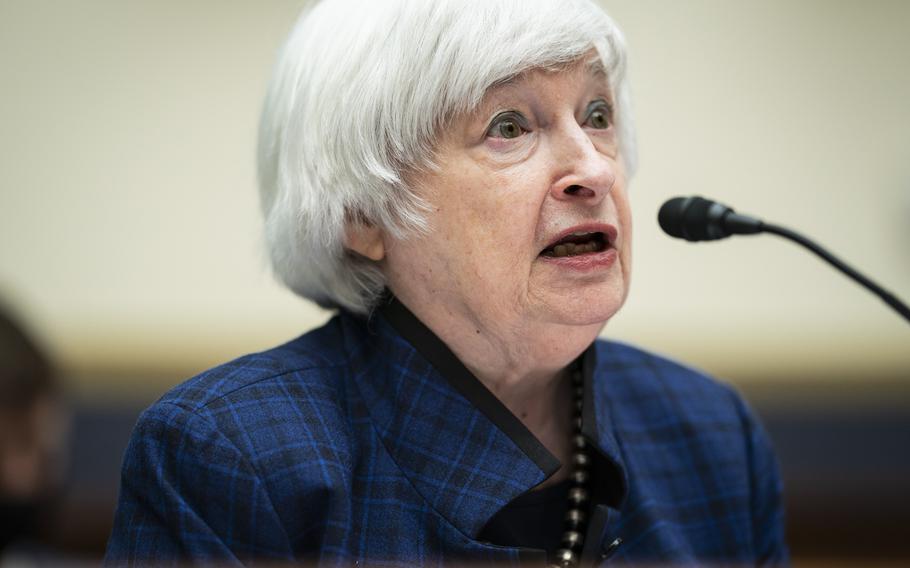U.S.
Ukrainian, US officials walk out of G-20 meeting when Russia speaks
The Washington Post April 20, 2022

Treasury Secretary Janet Yellen. (Jabin Botsford/The Washington Post)
WASHINGTON — At least a half-dozen world leaders, including officials with the U.S. and Ukrainian governments, walked out of a Group of 20 meeting in Washington on Wednesday when Russian officials began to speak, several people familiar with the matter said.
Treasury Secretary Janet Yellen and Federal Reserve Chair Jerome Powell were among the global economic leaders who left when Russian officials began talking, the people said. Among the others exiting the meeting were Chrystia Freeland, deputy prime minister of Canada; Christine Lagarde, president of the European Central Bank; and senior economic officials from the Netherlands, England, France and Germany, the people familiar with the issue said, speaking on condition of anonymity to describe a private meeting. Freeland also later publicly posted a photo of some of the officials who walked out.
The dramatic departures reflected the turmoil facing world leaders over Russia's invasion of Ukraine. While a number of nations joined the walkout, several other members of the G-20 — including China and India — did not. The fissures put on full display the growing global divide over whether and how to ostracize Russia from the international community over the war.
International finance ministers typically gather to discuss potential avenues for cooperation on global development, taxes, agriculture and a range of other issues. But the proceedings thus far this year have been disrupted by Russia's invasion of Ukraine and debate about how the world should respond.
After the meeting, Freeland said on Twitter: "This week's meetings in Washington are about supporting the world economy — and Russia's illegal invasion of Ukraine is a grave threat to the global economy. Russia should not be participating or included in these meetings."
The G-20 does not currently have a process for expelling members, and, even if it did, many of the organization's non-Western members have made clear they would resist booting Russia. Still, many of the nations opposed to Russia's invasion are seizing on the G-20 as an opportunity to make clear the extent of their displeasure with Moscow's actions. Freeland, the Canadian official, told Russian staff members attending the conference in person that they were serving a government that had committed war crimes, according to two of the officials familiar with what occurred in the meeting. Freeland also said the Russians should either persuade President Vladimir Putin to end the war or leave their government positions, the people said. Russian Finance Minister Anton Siluanov, who was placed under financial sanctions by the U.S. government earlier this year over the war, spoke at the conference remotely.
U.S. and British officials had been expected to shun their Russian counterparts. But the participation in the walkout by leaders from other nations reflected the degree of transatlantic unity against the war. Some of the officials attending the G-20 meeting virtually turned off their cameras when Russian officials spoke, two of the people said.
Still, several governments declined to participate in the walkout. The Italians opted not to participate because Italy belongs to the G-20′s rotating leadership "troika," consisting of the organization's current host and the immediate past and next hosts, according to a G-20 government official with knowledge of the session, who spoke on the condition of anonymity to discuss sensitive negotiations. That group is committed to keeping the G-20 open as an international forum, rather than closed.
Ukrainian officials addressed the meeting before Russia did, the people familiar with the matter said. Ukraine Finance Minister Denys Shmyhal was part of the walkout. The Ukrainian government has pushed the U.S. and its international allies to dramatically expand the scope of its sanctions regime.
The Treasury Department did announce additional sanctions on Wednesday, imposing new restrictions on the Russian commercial bank Transkapitalbank and a global network led by a Russian oligarch. U.S. officials had said that Yellen would boycott some meetings of the G-20, but it had not been clear exactly when she would leave or that she would do so during a speech by one of the Russian officials.
After the G-20 meeting, Yellen released a statement to the supervisory committee of the International Monetary Fund — which world leaders are also in Washington to attend — calling on the global financial community to respond to Russia's invasion.
"Russia's war against Ukraine has imperiled the global recovery from the pandemic and aggravated inflation, with vulnerable populations across the world feeling the effects of steeply rising food prices," the Yellen statement said. "Over the last two years, international financial institutions have provided unprecedented financing in response to COVID-19. Now, they must step in to help low-income and developing countries respond to food and energy shocks caused by the war, address the expanding refugee crisis in Europe, and bolster and rebuild an independent Ukraine."
The Washington Post's Rachel Siegel and Loveday Morris contributed to this report.